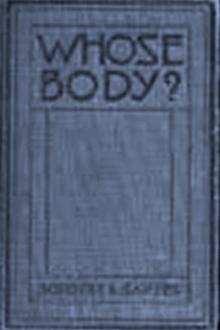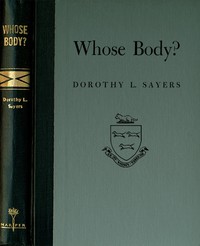Whose Body? by Dorothy L. Sayers (ebook reader web TXT) 📖

- Author: Dorothy L. Sayers
- Performer: -
Book online «Whose Body? by Dorothy L. Sayers (ebook reader web TXT) 📖». Author Dorothy L. Sayers
“Finally, gentlemen, I will frankly point out the weak point of all these hypotheses, namely: that none of them offers any explanation as to why the incriminating article was left so conspicuously on the body in the first instance.”
Mr. Parker had listened with commendable patience to this academic exposition.
“Might not X,” he suggested, “be an enemy of Crimplesham’s, who designed to throw suspicion upon him?”
“He might. In that case he should be easy to discover, since he obviously lives in close proximity to Crimplesham and his glasses, and Crimplesham in fear of his life will then be a valuable ally for the prosecution.”
“How about the first possibility of all, misunderstanding or accident?”
“Well! Well, for purposes of discussion, nothing, because it really doesn’t afford any data for discussion.”
“In any case,” said Parker, “the obvious course appears to be to go to Salisbury.”
“That seems indicated,” said Lord Peter.
“Very well,” said the detective, “is it to be you or me or both of us?”
“It is to be me,” said Lord Peter, “and that for two reasons. First, because, if (by Possibility No. 2, Hypothesis 1, Alternative A) Crimplesham is an innocent catspaw, the person who put in the advertisement is the proper person to hand over the property. Secondly, because, if we are to adopt Hypothesis 2, we must not overlook the sinister possibility that Crimplesham-X is laying a careful trap to rid himself of the person who so unwarily advertised in the daily press his interest in the solution of the Battersea Park mystery.”
“That appears to me to be an argument for our both going,” objected the detective.
“Far from it,” said Lord Peter. “Why play into the hands of Crimplesham-X by delivering over to him the only two men in London with the evidence, such as it is, and shall I say the wits, to connect him with the Battersea body?”
“But if we told the Yard where we were going, and we both got nobbled,” said Mr. Parker, “it would afford strong presumptive evidence of Crimplesham’s guilt, and anyhow, if he didn’t get hanged for murdering the man in the bath he’d at least get hanged for murdering us.”
“Well,” said Lord Peter, “if he only murdered me you could still hang him—what’s the good of wasting a sound, marriageable young male like yourself? Besides, how about old Levy? If you’re incapacitated, do you think anybody else is going to find him?”
“But we could frighten Crimplesham by threatening him with the Yard.”
“Well, dash it all, if it comes to that, I can frighten him by threatening him with you, which, seeing you hold what evidence there is, is much more to the point. And, then, suppose it’s a wild-goose chase after all, you’ll have wasted time when you might have been getting on with the case. There are several things that need doing.”
“Well,” said Parker, silenced but reluctant, “why can’t I go, in that case?”
“Bosh!” said Lord Peter. “I am retained (by old Mrs. Thipps, for whom I entertain the greatest respect) to deal with this case, and it’s only by courtesy I allow you to have anything to do with it.”
Mr. Parker groaned.
“Will you at least take Bunter?” he said.
“In deference to your feelings,” replied Lord Peter, “I will take Bunter, though he could be far more usefully employed taking photographs or overhauling my wardrobe. When is there a good train to Salisbury, Bunter?”
“There is an excellent train at 10.50, my lord.”
“Kindly make arrangements to catch it,” said Lord Peter, throwing off his bath-robe and trailing away with it into his bedroom. “And, Parker—if you have nothing else to do you might get hold of Levy’s secretary and look into that little matter of the Peruvian oil.”
Lord Peter took with him, for light reading in the train, Sir Reuben Levy’s diary. It was a simple, and in the light of recent facts, rather a pathetic document. The terrible fighter of the Stock Exchange, who could with one nod set the surly bear dancing, or bring the savage bull to feed out of his hand, whose breath devastated whole districts with famine or swept financial potentates from their seats, was revealed in private life as kindly, domestic, innocently proud of himself and his belongings, confiding, generous and a little dull. His own small economies were duly chronicled side by side with extravagant presents to his wife and daughter. Small incidents of household routine appeared, such as: “Man came to mend the conservatory roof,” or “The new butler (Simpson) has arrived, recommended by the Goldbergs. I think he will be satisfactory.” All visitors and entertainments were duly entered, from a very magnificent lunch to Lord Dewsbury, the Minister for Foreign Affairs, and Dr. Jabez K. Wort, the American plenipotentiary, through a series of diplomatic dinners to eminent financiers, down to intimate family gatherings of persons designated by Christian names or nicknames. About May there came a mention of Lady Levy’s nerves, and further reference was made to the subject in subsequent months. In September it was stated that “Freke came to see my dear wife and advised complete rest and change of scene. She thinks of going abroad with Rachel.” The name of the famous nerve-specialist occurred as a diner or luncher about once a month, and it came into Lord Peter’s mind that Freke would be a good person to consult about Levy himself. “People sometimes tell things to the doctor,” he murmured to himself. “And, by Jove! if Levy was simply going round to see Freke on Monday night, that rather disposes of the Battersea incident, doesn’t it?” He made a note to look up Sir Julian and turned on further. On September 18th, Lady Levy and her daughter had left for the south of France. Then suddenly, under the date October 5th, Lord Peter found what he was looking for: “Goldberg, Skriner and Milligan to dinner.”
There was the evidence that Milligan had been in that house. There had been a formal entertainment—a meeting as of two duellists shaking hands before the fight. Skriner was a well-known picture-dealer; Lord Peter imagined an after-dinner excursion upstairs to see the two Corots in the drawing-room, and the portrait of the oldest Levy girl, who had died at the age of sixteen. It was by Augustus John, and hung in the bedroom. The name of the red-haired secretary was nowhere mentioned, unless the initial S., occurring in another entry, referred to him. Throughout September and October, Anderson (of Wyndham’s) had been a frequent visitor.
Lord Peter shook his head over the diary, and turned to the consideration of the Battersea Park mystery. Whereas in the Levy affair it was easy enough to supply a motive for the crime, if crime it were, and the difficulty was to discover the method of its carrying out and the whereabouts of the victim, in the other case the chief obstacle to inquiry was the entire absence of any imaginable motive. It was odd that, although the papers had carried news of the affair from one end of the country to the other and a description of the body had been sent to every police station in the country, nobody had as yet come forward to identify the mysterious occupant of Mr. Thipps’s bath. It was true that the description, which mentioned the clean-shaven chin, elegantly cut hair and the pince-nez, was rather misleading, but on the other hand, the police had managed to discover the number of molars missing, and the height, complexion and other data were correctly enough stated, as also the date at which death had presumably occurred. It seemed, however, as though the man had melted out of society without leaving a gap or so much as a ripple. Assigning a motive for the murder of a person without relations or antecedents or even clothes is like trying to visualize the fourth dimension—admirable exercise for the imagination, but arduous and inconclusive. Even if the day’s interview should disclose black spots in the past or present of Mr. Crimplesham, how were they to be brought into connection with a person apparently without a past, and whose present was confined to the narrow limits of a bath and a police mortuary?
“Bunter,” said Lord Peter, “I beg that in the future you will restrain me from starting two hares at once. These cases are gettin’ to be a strain on my constitution. One hare has nowhere to run from, and the other has nowhere to run to. It’s a kind of mental D.T., Bunter. When this is over I shall turn pussyfoot, forswear the police news, and take to an emollient diet of the works of the late Charles Garvice.”
It was its comparative proximity to Milford Hill that induced Lord Peter to lunch at the Minster Hotel rather than at the White Hart or some other more picturesquely situated hostel. It was not a lunch calculated to cheer his mind; as in all Cathedral cities, the atmosphere of the Close pervades every nook and corner of Salisbury, and no food in that city but seems faintly flavoured with prayer-books. As he sat sadly consuming that impassive pale substance known to the English as “cheese” unqualified (for there are cheeses which go openly by their names, as Stilton, Camembert, Gruyère, Wensleydale or Gorgonzola, but “cheese” is cheese and everywhere the same), he inquired of the waiter the whereabouts of Mr. Crimplesham’s office.
The waiter directed him to a house rather further up the street on the opposite side, adding: “But anybody’ll tell you, sir; Mr. Crimplesham’s very well known hereabouts.”
“He’s a good solicitor, I suppose?” said Lord Peter.
“Oh, yes, sir,” said the waiter, “you couldn’t do better than trust to Mr. Crimplesham, sir. There’s folk say he’s old-fashioned, but I’d rather have my little bits of business done by Mr. Crimplesham than by one of these fly-away young men. Not but what Mr. Crimplesham’ll be retiring soon, sir, I don’t doubt, for he must be close on eighty, sir, if he’s a day, but then there’s young Mr. Wicks to carry on the business, and he’s a very nice, steady-like young gentleman.”
“Is Mr. Crimplesham really as old as that?” said Lord Peter. “Dear me! He must be very active for his years. A friend of mine was doing business with him in town last week.”
“Wonderful active, sir,” agreed the waiter, “and with his game leg, too, you’d be surprised. But there, sir, I often think when a man’s once past a certain age, the older he grows the tougher he gets, and women the same or more so.”
“Very likely,” said Lord Peter, calling up and dismissing the mental picture of a gentleman of eighty with a game leg carrying a dead body over the roof of a Battersea flat at midnight. “‘He’s tough, sir, tough, is old Joey Bagstock, tough and devilish sly,’” he added, thoughtlessly.
“Indeed, sir?” said the waiter. “I couldn’t say, I’m sure.”
“I beg your pardon,” said Lord Peter; “I was quoting poetry. Very silly of me. I got the habit at my mother’s knee and I can’t break myself of it.”
“No, sir,” said the waiter, pocketing a liberal tip. “Thank you very much, sir. You’ll find the house easy. Just afore you come to Penny-farthing Street, sir, about two turnings off, on the right-hand side opposite.”
“Afraid that disposes of Crimplesham-X,” said





Comments (0)